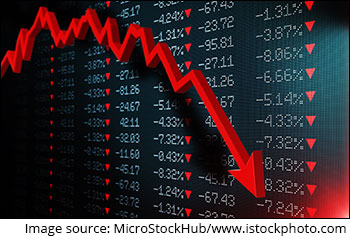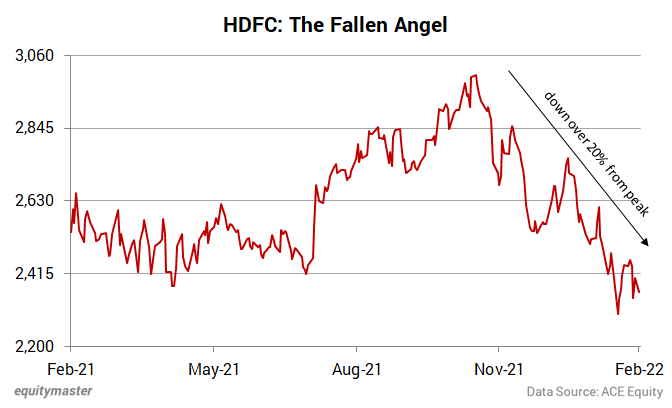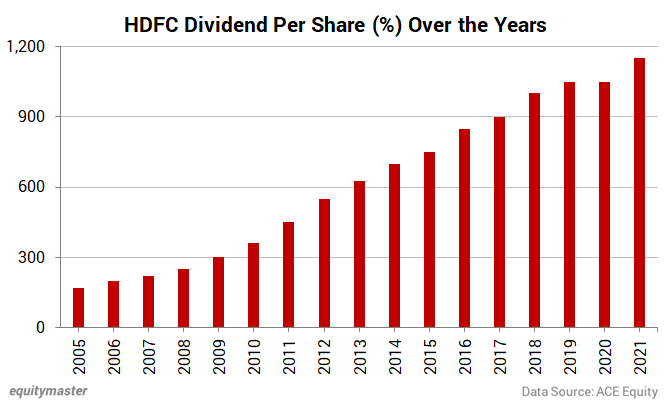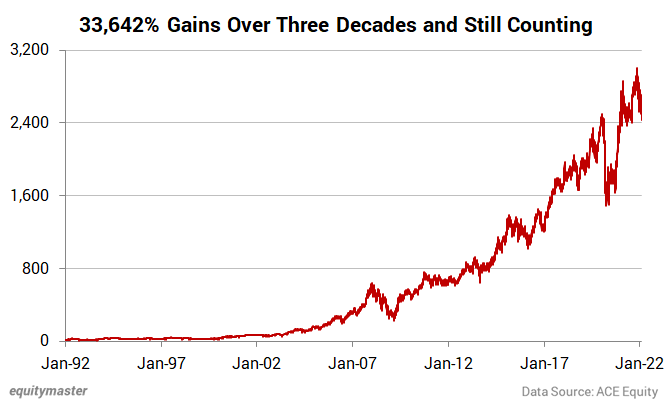- Home
- Views On News
- Mar 1, 2022 - Why HDFC's Stock is Down Over 20%
Why HDFC's Stock is Down Over 20%

One of the biggest and surely the top wealth creators in Indian share markets.
A constituent of BSE Sensex and NSE Nifty.
A rock-solid balance sheet.
A good track of asset quality with zero net Non-Performing Assets (NPAs).
Consistency of paying dividends with payouts of above 20%.
A dominant market position.
If you stack up these factors, it will be hard to present a case of not making an investment in the stock of Housing Development Finance Corp (HDFC).
However, the reality is different.
The share price of India's biggest mortgage lender HDFC is down in the dumps. Among other things, it appears the company is caught up in the broad-based selling amid the Russia-Ukraine crisis.
22%. That's how much the stock has lost from its 52-week highs.
All this for a firm that is touted to be one of the best ways to ride India's growth story.

Why is HDFC suffering on the bourses?
On 2 February, HDFC posted its quarterly results and since then, it's on a downward trend. So is the stock under pressure because of its results? Or is this just a coincidence?
For the quarter under review, HDFC reported a 11% jump in net profit at Rs 32.6 bn on the back of higher income and lower-than-expected credit loss.
Net interest income (NII) increased by 7% to Rs 42.8 bn.
Asset quality deteriorated slightly because the lender recognised some loans as non-performing, which were overdue for less than 90 days.
Quite a solid set of numbers, right?
So, if it's not the business, then it must be geo-political tensions.
As far as we know, HDFC has no direct exposure to any of countries engaged in war. In fact, it's solidly focused on the domestic market.
And the mega trends the business is riding are expected to last many years, if not decades.
If that's not it too, what could be the reason?
In a way, the reason for the selloff is quite mundane.
The US Federal Reserve's decision to tighten monetary policy and the geopolitical tensions have triggered safe haven buying.
Now don't let this phase scare you.
All this means is that global money which was looking for returns in all kinds of markets is now starting to flow back to their home country. And since the US is the spigot for such flows, the money is flowing back to the US.
So how does this all impact the share price of HDFC?
Well, the selling by foreign institutional investors (FIIs) is bound to impact the overall sentiment in the market.
The more FIIs sell, the more it's going to hurt stock prices.
If you are a keen follower of the markets, by now you know that FIIs are selling Indian equities big time.
As per a report, in the year ending March 2022 so far, FIIs have net sold more than US$29 bn worth of shares (Rs 2.22 lakh crore). What's interesting is that 80% of this was sold in the last five months.
Now, while the common investor is going to read this headline and say all is doomed...
Step back and think a bit.
In a situation like this, when the FIIs are forced to sell stocks to send money back home, what do you think they will sell?
Whatever they can.
And this is where things get interesting, dear reader.
You see, FIIs have owned a large chunk of HDFC for years. Like we said it's perhaps one of the best ways to play the Indian opportunity.
Now, when they are "forced" to sell, they have no choice but to also sell their core holdings too.
So HDFC, and other HDFC group stocks, which have been favourites of FIIs, are seeing a sell off.
Take a look at this...
HDFC Group Companies Under Pressure amid FII Selloff
| Company | 52-Week High | Current Price | Fall from Peak (%) | FII Stake (%) |
|---|---|---|---|---|
| HDFC | 3,021 | 2,361 | -22% | 72.1 |
| HDFC Bank | 1,724 | 1,428 | -17% | 37.5 |
| HDFC AMC | 3,363 | 2,092 | -38% | 10.5 |
| HDFC Life | 776 | 523 | -33% | 30.5 |
Stocks such as ICICI Bank, Infosys among others, which have high foreign ownership, have also sold off.
Take a look at the table below which shows the top 10 stocks with highest FII exposure and how they have fared...
Sell-off led by FIIs or poor results?
| Company | FII holding (%) | Sales growth YoY (%) | Profit growth YoY (%) | Fall from peak (%) |
|---|---|---|---|---|
| Shriram Transport | 53.15 | 9.1 | -6.5 | -34% |
| Apollo Hospitals | 52.41 | 31.9 | 100.1 | -19% |
| Zee Entertainment | 52.21 | -22.6 | -24.9 | -40% |
| IndusInd Bank | 47.65 | 6.9 | 49.5 | -26% |
| Axis Bank | 47.44 | 12.6 | 200.2 | -14% |
| ICICI Bank | 45.28 | 9.5 | 18.9 | -14% |
| Kotak Mahindra Bank | 42.06 | 6.1 | 30.8 | -18% |
| Crompton Greaves | 40.17 | 4.6 | 1.9 | -16% |
| Redington | 40.04 | -2.2 | 94.4 | -15% |
| Jubilant FoodWorks | 39.77 | 13.2 | 9.5 | -36% |
Results data as on December 2021
As can be seen from the table above, even as companies reported good results or beat street estimates, they have sold off because of higher FII holding.
Axis Bank, Apollo Hospital, IndusInd Bank and the likes put on a strong performance in the December quarter but it was shadowed due to FII selling.
While we can't say stocks are falling primarily because of FII exposure, it seems like the FII selloff was perhaps a big reason.
But the fall was under check and the impact of FII selling was limited, all thanks to retail investors.
For quite some time now, FIIs have taken charge of Indian share markets to some extent. Any sudden increase or decrease from FIIs have sent stocks on a ride.
But this time it's different.
2021 showed us how India's dependence on FIIs has reduced. The participation of retail as well as domestic institutions is now significant. Even if FIIs remain bearish, the India growth story would remain intact.
Coming to the second important factor behind HDFC's underperformance...
The Reserve Bank of India (RBI) recently decided to maintain the status quo on key policy rates saying the low-interest rate regime would boost the growth of the housing sector.
HDFC primarily being a retail home loan lender, with individual loans forming over 75% of its book, benefits from these low interest rates. Lower interest rates, among other factors, are a trigger for more demand for loans.
But there could be headwinds going forward as interest rates rise.
While analysts are seeing this as a concern, the company's management is indicating otherwise. HDFC chairman Deepak Parekh recently said that even though interest rate cycles may move up and down, customers who want a home will not hold back.
Are all the negatives priced in after a 20% fall in HDFC?
Now the all-important question investors must be asking is should they buy HDFC amid this stock market sell-off?
Is this a good time to buy this winner for the future?
Let's look at the rationale to understand the risk-reward situation.
Riding high on India's real estate cycle
The correction in HDFC has surely made it an attractive investment opportunity at the current level.
A main factor which is supporting HDFC is the robust demand for housing.
Housing affordability levels in the Indian property market are at their highest and are unlikely to be adversely impacted in the near term as incomes are rising faster than real estate prices, Parekh was quoted as saying.
Prices have remained fairly stable and low interest rates have helped. HDFC being India's largest and most trusted mortgage finance companies, is set to leverage the upside in India's real estate cycle better than any other corporate.
Talk about consistency
Another supporting claim for HDFC is its track record of paying dividends.
HDFC is a consistent dividend growth stock. Its past 4 dividends amount to 1,000% of the face value.

So even if the stock dips some more from the current level, investors won't complain as they'll be making passive income via dividends.
A company with an enviable stock portfolio
HDFC together with its wholly-owned subsidiaries, HDFC Investments and HDFC Holdings holds 21.1% of HDFC Bank.
It also has a 49.9% stake in HDFC Life and a 52.7% stake in HDFC AMC.
HDFC plans to list its unlisted subsidiaries such as HDFC Ergo and HDFC Credila in the coming years. It has also committed to investing Rs 1 bn in technology start-ups every year.
Even if a few of them go on to become credible investments for HDFC, they could yield massive returns for investors.
To conclude...
In a sector which is so closely linked to the macro environment, HDFC's ability to manoeuvre through market cycles with exceptional capital allocation sets it apart from other NBFCs.
As we pointed out earlier, HDFC has been the ultimate wealth creator in Indian share markets.

So, will HDFC continue its slow and steady journey and climb upward?
There's a good change of that happening over the long term given its resilient balance sheet, sustained margins and impeccable asset quality.
Happy Investing!
Disclaimer: This article is for information purposes only. It is not a stock recommendation and should not be treated as such. Learn more about our recommendation services here...

Yash Vora is a financial writer with the Microcap Millionaires team at Equitymaster. He has followed the stock markets right from his early college days. So, Yash has a keen eye for the big market movers. His clear and crisp writeups offer sharp insights on market moving stocks, fund flows, economic data and IPOs. When not looking at stocks, Yash loves a game of table tennis or chess.
Equitymaster requests your view! Post a comment on "Why HDFC's Stock is Down Over 20%". Click here!
1 Responses to "Why HDFC's Stock is Down Over 20%"


Ramesh
Mar 6, 2022Very informative. Thank you.